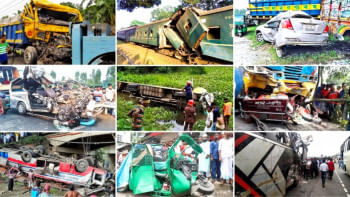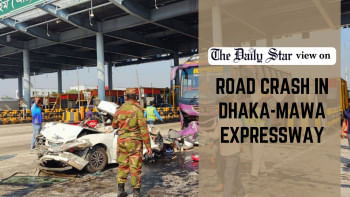When will our roads be safe?

The figure 8,543 is not just a statistic representing the fatalities from road crashes in 2024. It symbolises the lives we, as a nation, have failed to protect from our unsafe roads. In fact, according to a report by Bangladesh Jatri Kalyan Samity, our roads were less safe last year compared to 2023—crashes increased by 1.56 percent, fatalities by 8.11 percent, and injuries by 21.56 percent—indicating a deteriorating trend.
The Jatri Kalyan Samity attributed the rise in crashes and deaths to the increasing number of motorcycles and battery-run auto-rickshaws, as well as the illegal operation of both high-speed and slow-moving vehicles on highways. In 2024, motorcycle-related crashes accounted for 36.62 percent of all incidents and 30.08 percent of all fatalities. The inherent instability of these vehicles makes them particularly prone to accidents. Yet, the previous government's policies encouraged their proliferation. Similarly, it failed to curb the rampant use of motorised three-wheelers, vehicles with almost no safety features, which have become a significant contributor to highway crashes of late.
We have discussed the factors behind road crashes—such as unfit vehicles, reckless driving, unskilled drivers, and the unholy nexus between transport leaders, politicians, and law enforcers—ad nauseam, while numerous experts offered recommendations. But little has changed. The authorities attempted a number of road safety initiatives but succumbed to pressure from transport owners and associations.
Although many of the leaders and politicians linked to the previous regime—key players in perpetuating irregularities in the transport sector—are now on the run, the systemic problems in the sector persist. A recent example was the violent crash at the Dhaka-Mawa-Bhanga Expressway toll plaza, which claimed at least six lives. The bus that rammed into three parked vehicles there had no legal documents, the driver lacked a valid license, and the owner allegedly bribed a close associate of a former lawmaker to operate it on that route.
We urge the government to take decisive steps to stop such corrupt practices and make our roads safe, keeping in mind how previous ad hoc and unplanned efforts have repeatedly failed. Establishing a dedicated commission to reform the sector and fully implementing the Road Transport Act, 2018, could be crucial first steps. It is high time for change—too many lives have already been lost.

 For all latest news, follow The Daily Star's Google News channel.
For all latest news, follow The Daily Star's Google News channel. 










Comments